ARS Youth Connect Program Takes Place on Nov. 5
Special for the Armenian Weekly
CAMBRIDGE, Mass. (A.W.)—Following the overwhelming success of the annual Youth Connect Program (YCP) held at New York University (NYU) in March, the Armenian Relief Society (ARS) YCP held its second installment of 2016 on Nov. 5 at the Massachusetts Institute of Technology (MIT). About 60 young Armenian students from the Eastern and Western United States and Canada participated in the program that was was organized by the ARS Eastern United States and co-sponsored by the MIT Armenian Society, and once again directed by the Henry S. Khanzadian Kazan Visiting Professor at CSU Fresno, Dr. Khatchig Mouradian.
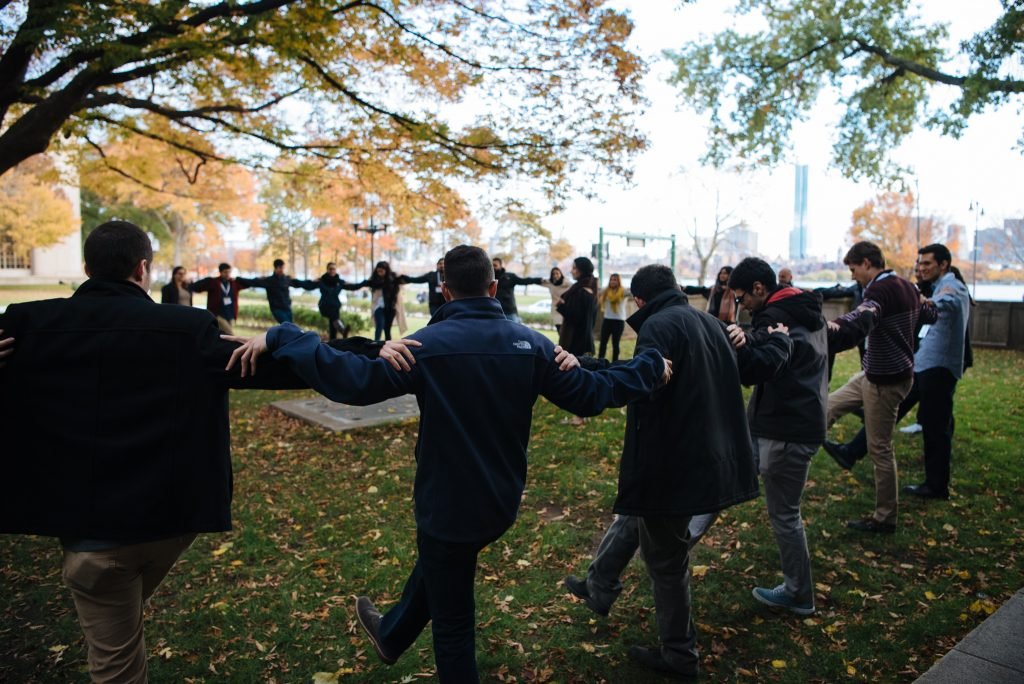
The program titled “Roots and Wings” featured lectures on the Armenian identity and investigative journalism, workshops on Armenian genealogy, Armenian folk dance, and a look into the recent developments in Turkey. Speakers and workshop leaders included three-time Pulitzer Prize-winning investigative reporter Stephen Kurkjian, Western Armenian demographics expert George Aghjayan, folk dance workshop leader Taleen Mardirossian, and human rights lawyer and activist Gaye Ozpinar.
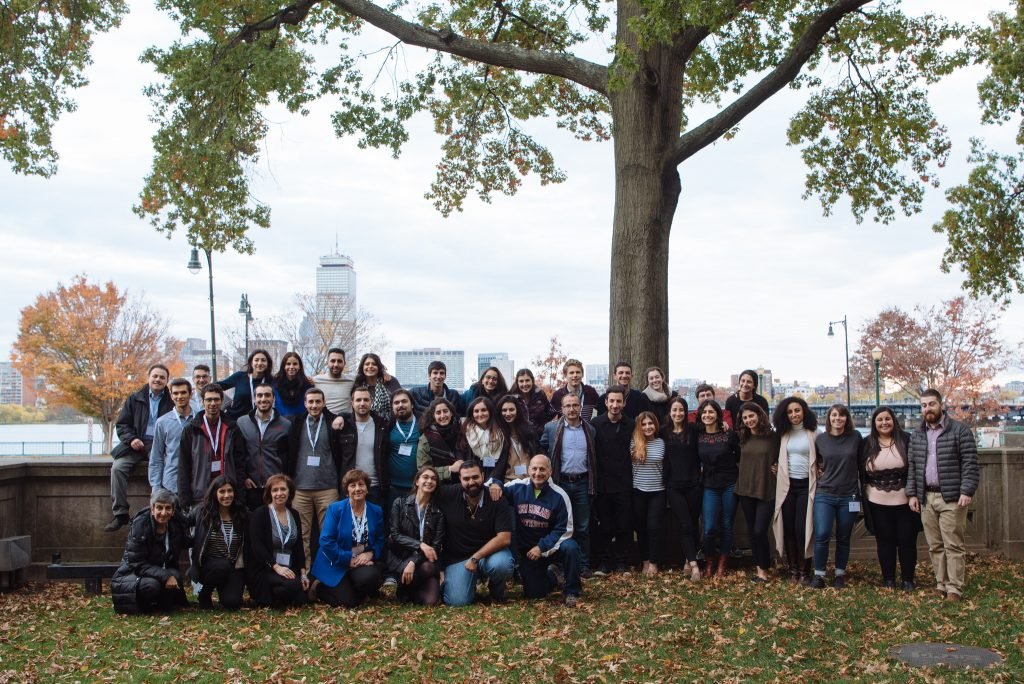
Speaking briefly about his experience as an investigative journalist for the Boston Globe, Kurkjian explained how he was the newspaper’s former Washington bureau chief and a founding member of the investigative Spotlight Team. As a son of an Armenian Genocide survivor, he recalled the time his retired father said, “I’d like to be back in my village,” referring to his home town, which was south of Erzerum. According to Kurkjian, that moment—although late in life—caused him to embrace his Armenian heritage and think about how he could make use of his skills to help his community.
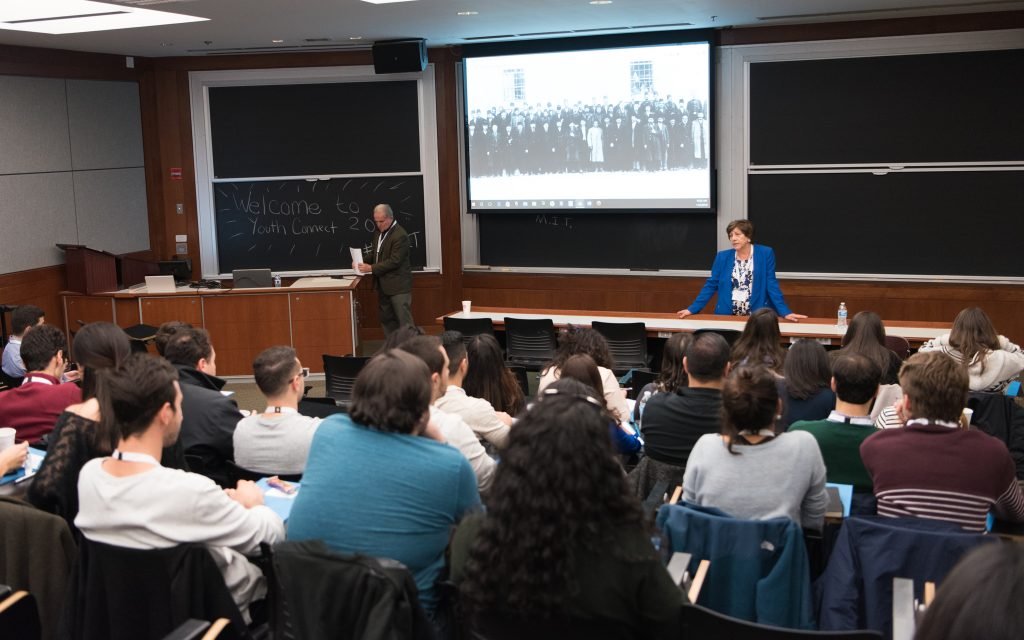
He then spoke of his experience to uncover the truth of his father’s story of survival, which was very seldom spoken about during his childhood. Kurkjian explained how he came across an opportunity to learn more about the genocide when he received a call from a woman who had in her possession a photo of 55 Armenian men at the time of the genocide, but only knew the name of one individual in the photo. Kurkjian explained how he gathered more information on the men and how he was able to write up a piece as an investigative journalist. He emphasized how it is the responsibility of young Armenians to turn their “roots of sorrow” into “seeds of hope.”
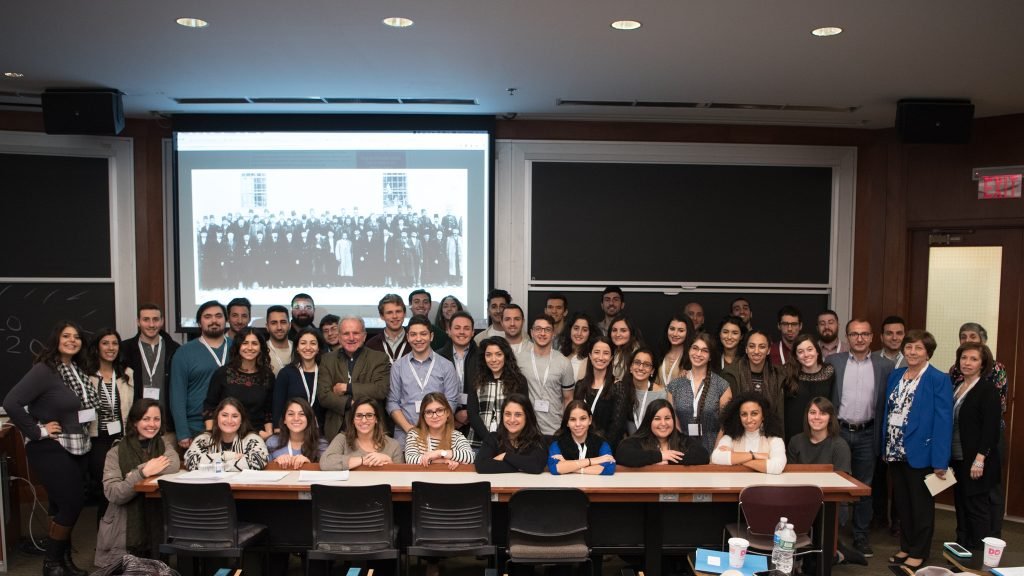
Kurkjian stressed that in the diaspora, Armenians must also utilize their careers to help their communities. “Every individual has a skill to harness to help Armenia,” said Kurkjian, as he urged all those in the room to make sure to give back to Armenia and the Armenian community in whatever field they dream to succeed in. Kurkjian ultimately set an example of how he used his career as an investigative journalist to write about the Armenian Genocide and bring awareness to it.
The second speaker, George Aghjayan, spoke about how initially, although he loved Armenian history, he did not take advantage of available technology to record his grandparents’ story of survival. Starting from that realization and his need to record his last surviving grandmother, Aghjayan took the participants through a journey through time, as he revealed the step-by-step process of how he discovered his great grandmother’s story of survival. He began by explaining how through ship records and archives from the Georgetown Girls project, he was able to find more information about his great grandmother and about the family that helped her escape during the genocide.
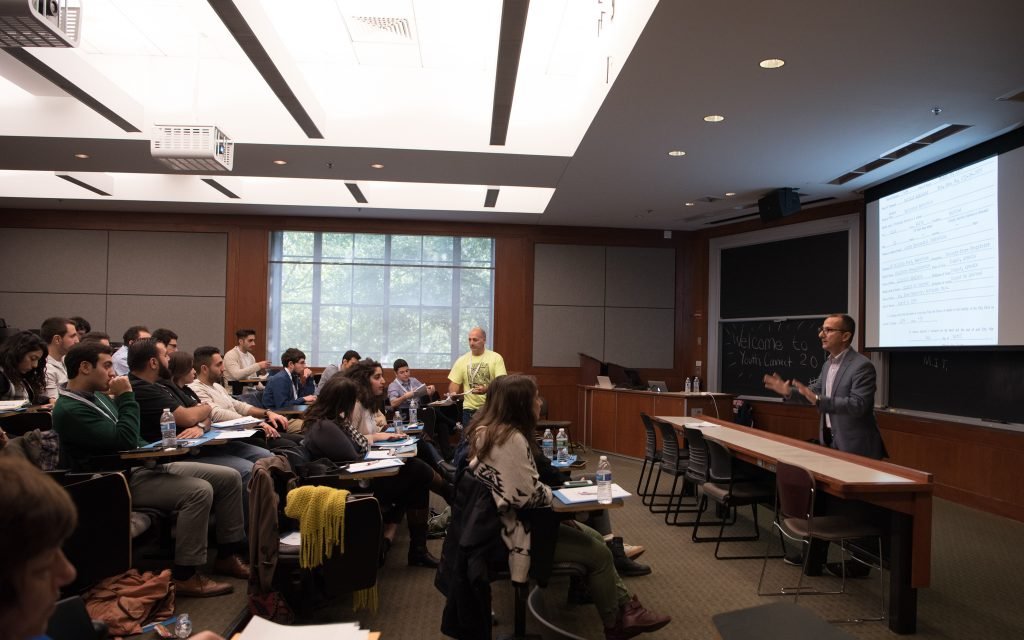
Aghjayan also discussed the way DNA testing works and how useful it is to learn more about our roots. He explained how he was able to find two cousins through DNA testing, including a relative from Turkey. “I was able to bring two of the 1.5 million martyrs of the Armenian Genocide back from the dead when I traced the complete story of my great grandparents,” Aghjayan said.
Aghjayan concluded his workshop by providing the participants with resourceful tools and search methods on how anyone could trace their lineage and inquire more about where their ancestors came from. He then challenged participants to make their own family tree and learn as much as possible about their roots in Western Armenia, since it is a method of recapturing family history while bringing justice.
“My favorite part was when we went around the room and everyone got to share where their ancestors are from,” said YCP participant and University of San Francisco graduate Natalie Kamajian. “Moments like that are so crucial for Armenian youth. The more we learn about our roots, together, the stronger we’ll become,” she added.
Given the fact that prior to YCP, several members—including the two co-chairs—of the Peoples’ Democratic Party of Turkey (HDP) were detained, Gaye Ozpinar joined the lineup of the speakers to discuss the recent developments in Turkey. Ozpinar provided some background on the HDP and her role as a member in the U.S. She also explained about her work with Bostonbul, a group of students, activists, academics, and citizens of Turkey living in Boston. She then presented a brief history of Turkey— ranging from the days of Ataturk and the movement of westernization, to the history of coups in Turkey and the foundation of the Kurdish movement.
Ozpinar discussed how coups have been a common occurrence throughout Turkish history and explained how the U.S. tries to shape the economy and politics of Turkey. She then mentioned Fethullah Gulen and his role in Turkish history and the network of schools he has created around the world through his education movement.
According to Ozpinar, the Kurdish movement has been gaining momentum in Turkey in recent years, and although pro-Kurdish political parties have constantly been banned in the past, the ideology has always remained constant, as the Kurdish population in Turkey continues to have an impact on society; especially in the recent years, with their increasing seats in parliament.
Ozpinar explained how she was born and raised in Turkey, but left when she was 18. She said that when the Gezi Park uprising took place, she felt the need to be in Turkey to take part in the demonstrations there. She expressed the need for solidarity and stated how she brought the movement back to Boston and mobilized the Turkish community there, in order to show support to their brothers and sisters in Turkey. Ozpinar’s insight about the recent developments in Turkey was very informative and interesting to the participants, as helped them understand the factors behind the current issues in Turkey and the struggle of those who oppose the ruling regime, including fellow ethnic Armenian Member of Parliament Garo Paylan (HDP).
The final workshop was led by Taleen Mardirossian, an attorney from Los Angeles, currently pursuing a Masters of Fine Arts in creative writing at Columbia University. A descendant of Sassoun, Mardirossian’s workshop consisted of teaching the participants traditional Armenian dances. The workshop led to a massive shourch bar at MIT’s Killian Court, overlooking the Boston skyline. The two main dances that were taught were the Msho Khr and the Karno Kochari.
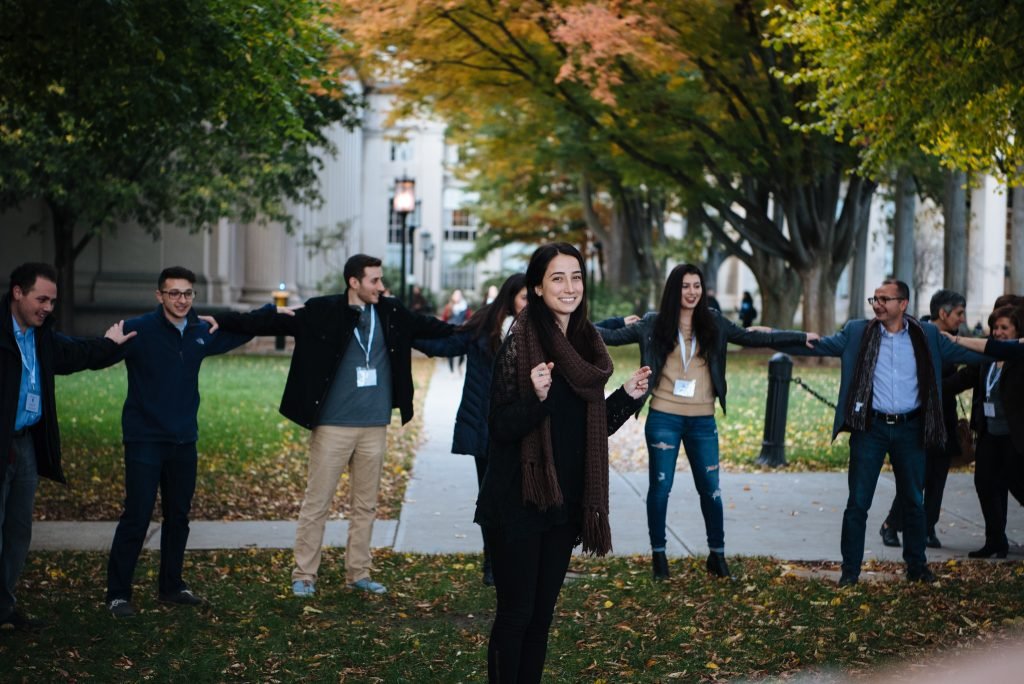
Mardirossian explained the history and cultural significance of the dances before beginning the workshop. She mentioned that the Msho Khr is a dance from the greater Daron region. The Karno Kochari is a dance that embodies the movement of the ram.
Mardirossian emphasized how these dances have played a major role in Armenian culture and have helped uphold tradition. Dances like the ones learned by the participants were performed on various occasions including celebrations and times of war. Everyone actively participated in the workshop, which caught the attention of passersby—some of who even joined the dances. It was a beautiful moment, during which young Armenians from different cities were joined by the art of traditional Armenian dance.
“Dance as if you will move mountains,” Mardirossian said while she taught the steps of the traditional dances.
The ARS YCP continues to serve its purpose by providing an atmosphere for young Armenian students from different campuses to come together to establish important connections, while learning from inspirational speakers.
Reflections from ARS YCP 2016
“Having recently moved to the East Coast, I thoroughly appreciated this incredible opportunity to meet and befriend so many like-minded and passionate young Armenians. The ARS YCP truly gave us—the Armenian youth of the U.S. and Canada—the chance to connect while learning about and discussing topics prevalent in the contemporary discourse.”
– Hasmik Baghdasaryan, Columbia University graduate student
“YCP gives us the tools to better shape the trajectory of our lives, our communities, and our homelands—both the current republic and the ancestral lands we are beginning to rediscover. Though YCP is only a one-day event, its recipe of intellectual stimulation, positive energy, and sheer fun turns ephemeral encounters into deep, personal connections, where strangers become family. I feel rejuvenated after each workshop and cannot wait to begin utilizing my newly acquired knowledge.”
– Lilly Torosyan, Boston University graduate
“Having attended the YCP program for the past several years, I’ve seen its growth from its early years as a week long program at Bentley with 10 students to a weekend program at NYU with 100 students. The opportunity opened up to do a second installment of the YCP here in Boston, and Dr. Mouradian and the ARS reached out to me for the possibility of hosting at MIT. We were very happy to see the large student attendance from various cities, and their active participation in the lectures and workshops organized by Dr. Mouradian. We are looking forward to seeing this become a recurring event each year to further provide educational and networking opportunities among college students and young professional Armenians.”
– Vazrik Chiloyan, PhD student and Member of the Armenian Society of MIT


As a member of the Armenian Relief Society, Western Region, myself, I am very proud of the efforts of our sisters in the Eastern Region. This is such an important and uplifting program. Getseh, ARS YCP!